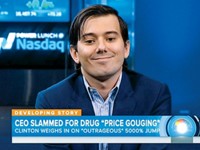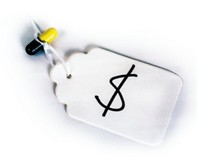Advertisement
Grab your lab coat. Let's get started
Welcome!
Welcome!
Create an account below to get 6 C&EN articles per month, receive newsletters and more - all free.
It seems this is your first time logging in online. Please enter the following information to continue.
As an ACS member you automatically get access to this site. All we need is few more details to create your reading experience.
Not you? Sign in with a different account.
Not you? Sign in with a different account.
ERROR 1
ERROR 1
ERROR 2
ERROR 2
ERROR 2
ERROR 2
ERROR 2
Password and Confirm password must match.
If you have an ACS member number, please enter it here so we can link this account to your membership. (optional)
ERROR 2
ACS values your privacy. By submitting your information, you are gaining access to C&EN and subscribing to our weekly newsletter. We use the information you provide to make your reading experience better, and we will never sell your data to third party members.
Pharmaceuticals
The Price Of Drugs
by Lisa M. Jarvis
September 28, 2015
| A version of this story appeared in
Volume 93, Issue 38
The following editorial is by Lisa Jarvis, C&EN senior correspondent and pharmaceutical editor.
Unless you’re a pharmaceutical industry news junkie, chances are you hadn’t heard of Martin Shkreli until last week when photos of a guy posing audaciously in front of a Flo Rida video started taking over your social media stream. But over the course of 24 hours, Shkreli, the chief executive officer of Turing Pharmaceuticals, became public enemy number one.
His crime? Greed in the first degree. On Sunday, Sept. 20, media outlets reported that Shkreli’s firm had jacked up the price of Daraprim, a decades-old treatment for a serious parasitic infection that strikes the immunocompromised, from $13.50 to $750 per pill—a 5,000% increase. As he defended himself in interviews and exchanged barbs with haters on Twitter, Shkreli came to embody everything the public thinks is wrong with the drug industry.
One could easily reduce the entire affair to a negative turn of the social media cycle; wait a few days, and it’ll rotate to the next villain. But the incident has put the pharmaceutical industry, which was already feeling heat over drug prices, in the crosshairs during the run-up to a presidential election. All it took was one tweet from Hillary Clinton saying she’d come out with a plan to prevent “price gouging like this” for biotech stocks to tumble by nearly 5% last Monday.
The issue of drug pricing clearly needs addressing. Patients shouldn’t have to worry about going bankrupt to pay for essential medicines—especially ones they once could easily afford. On the other hand, companies need to turn a profit. It’s the classic Goldilocks problem: consumers, companies, and insurers need to settle on the “just right” price for drugs.
And yet the conversation last week around that “just right” price too often treated the pharmaceutical industry as a monolith. It’s not. Some companies are working on cutting-edge science and breakthrough medicines, while others’ bread and butter is squeezing a profit out of generic drugs. Many business models fall in between. All the approaches are valid and necessary if we want to maintain and grow the options in our medicine cabinet.
But reasonable profit margins for drugs along that continuum can and should vary, and public discourse thus far hasn’t made this distinction. In particular, the media seemed to conflate the high price of a truly innovative, just-launched drug—such as Gilead Sciences’ hepatitis C virus treatment Harvoni (see page 47) or Vertex Pharmaceutical’s cystic fibrosis drug Orkambi—with that of an old, generic one such as Daraprim.
Shkreli himself put Daraprim in the same league as newer drugs in several media appearances. In one interview, he noted that life-saving new drugs such as cancer immunotherapies or rare disease treatments often cost $100,000 a year or more. “Daraprim is still underpriced relative to its peers,” he claimed.
But is it really fair to put a drug that’s been off patent as long as Daraprim has in the same category as a treatment that required substantial R&D investment and significant risk? No.
When it comes to Harvoni, the fair pricing question is, “How high is too high?” Gilead’s profit margins currently exceed 50%, a level critics say is excessive given the burden the firm’s drugs create for the health care system. But in calling for measured pricing, we also can’t suggest a company with an innovative drug accept generic-drug-like margins.
For a drug like Daraprim, we need to ask, “How low is too low?” As Americans, we live in a capitalist economy. Companies can’t be expected to operate at a loss, and we’ve already seen that supplies of much-needed generics—including critical cancer drugs—can dwindle without a price incentive. In many cases, manufacturers aren’t willing to swallow the cost of updating the facilities that make older drugs, or they choose to use limited capacity to make higher-margin products.
After three days of brutal treatment in the press, Shkreli finally, if obliquely, acknowledged that his company reached too high. During an evening news segment, he announced that Turing would lower the price of the drug. He didn’t say what the new price would be, but claimed it would be enough to offer his company a small profit. Assuming the new price is close to the original, that actually sounds fair.
Views expressed on this page are those of the author and not necessarily those of ACS.





Join the conversation
Contact the reporter
Submit a Letter to the Editor for publication
Engage with us on Twitter